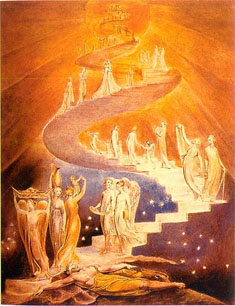Sermon 80

Do Your Duty
Mark 8:34
March 4, 2012
Grace and peace to
you, in the name of God the Father, Son (X)
and Holy Spirit. Amen.
Jesus tells us in Mark 8:34 to deny ourselves. But what does that
amount to? Are we, for instance, to deny all medical care, education,
friendship, job training, food, and housing? Søren Kierkegaard
(1813-1855), that keen Lutheran author, measures and weighs this
self-denial or self-hatred in,
Works of Love (1847). In that book he does this by warning against
five of its abuses:
When the bustler wastes his time and
powers in the service of futile, inconsequential pursuits…. When the
light-minded person throws himself almost like a nonentity into the
folly of the moment and makes nothing of it…. When the depressed person
desires to be rid of life, indeed, of himself…. When someone surrenders
to despair because the world or another person has faithlessly left him
betrayed…. When someone self-tormentingly thinks to do God a service by
torturing himself…. (Kierkegaard’s
Writings 16:23).
This futility, this folly, this
depression, this despair, this torture – all of these are fueled or
encouraged when we deny ourselves in the wrong way. So how can we heed
our Lord’s admonition, deny ourselves properly, and, at the same time,
avoid these five pitfalls?
A Tale of Seduction
In Kierkegaard’s little book, also
published in 1847, with the long title,
What Can We Learn from the Lilies
in the Field and from the Birds of the Air? – which is based on the
parable of Jesus in the Sermon on the Mount (Matthew 6:25-34) on the
lilies and the birds, he says that what the follower of Christ needs to
deny is the desire “to compare himself to God [or] to have a security by
himself” (KW 15:178). This is
what self-denial is supposed to attack.
He takes up this horrible blunder, of wanting to be like God,
which self-denial is to unravel, in a little parable in that book, about
a seduced lily. It’s out in the field, where “imperceptibly and
blissfully time slipped by, like running water that murmurs and
disappears” (KW 15:167). Then
a little bird visits in the beauty of the field – coming and going at
will – almost capriciously. “But as so often happens,” Kierkegaard
writes – forebodingly, “the lily fell more and more in love with the
bird precisely because it was capricious” (KW
15:167)! Can you hear in this the echo of John 3:19 – “the light has
come into the world, and men loved darkness rather than the light”?!
Kierkegaard then goes on to say that
this little bird was a naughty bird.
Instead of … delighting in [the lily’s] loveliness,… the bird would show
off in its feelings of freedom by making the lily feel its lack of
freedom. Not only that, but the little bird… talked… truthfully and
untruthfully, about how in other places there were… gorgeous lilies in…
rapture and merriment…. And it usually ended its story,… humiliating to
the lily, that in comparison… the lily looked like nothing (KW
15:167).
And with that the lily was crushed. So
what happened next? The naughty bird agrees to peck the soil away “from
the root of the lily,” take it under its wing, and fly off to the place
of beautiful lilies, and plant it there, so that it “might succeed in
becoming a gorgeous lily” too (KW
15:168-169)! Sounds pretty good, doesn’t it? But what happens? “Alas, on
the way the lily withered” (KW
15:169)! Alas, indeed – for now its dreams of glory are over!
Doing Your Duty
Kierkegaard concludes by saying that
“the lily is the human being. The naughty little bird is the restless
mentality of comparison, which roams far and wide, fitfully and
capriciously, and gleans the morbid knowledge of diversity…. The little
bird is [what’s] seductive in [us],…. the conflict of discontented
comparison” (KW 15:169, 181).
And this seduction is morbid – for it destroys the life of peace that
God has in mind for his children (Philippians 4:4-13). It keeps us from
exclaiming: “O Lord, my heart is not [occupied] with things too great
and marvelous for me” (Psalm 131:1)!
In whatever we do, then, we must not think we’re in control (John
15:5). For that would be to long to be like God (Romans 1:22-25). In
whatever walk of life we pursue, where ambition and hard work definitely
have their place (Galatians 6:4-5), we must give all the glory to God (1
Corinthians 10:31). Self-reliance is always wrong for the Christian
(Deuteronomy 8:17; Isaiah 64:6; Luke 18:9; James 4:14-15). We instead,
should think of ourselves as servants – and unworthy ones, at that – who
are only doing our duty (Luke 17:10). So if we’re teachers or mechanics,
lawyers or artists, presidents or entrepreneurs, truck drivers or
restaurant employees, don’t forget you’re still unworthy servants just
doing your duty – ambassadors for Christ in whatever walk of life you’re
in (2 Corinthians 5:20). That’s your most resilient, basic identity –
and it holds even if your vocation fails. For everything else is
secondary. So don’t succumb to “inflated self-importance,” as Martin
Luther warned (Luther’s Works
52:208). Say with Kierkegaard:
Dependence on God is the only
independence, because God has no gravity; only the things on this earth,
especially earthly treasure, have that – [so] the person who is
completely dependent on him is light (KW
15:182)!
So don’t compare yourself to those above
you socio-politically, as Luther again warned (LW
21:320). Remember you’re a person like everyone else – just a man. Deny
everything else that wells up within you to seduce you – as happened to
our poor little lily in Kierkegaard’s parable. And then, with our astute
Danish writer,
consider Solomon. When he puts on his
royal robs… there is… ceremonial address, and the one speaking says:
Your Majesty. But when the most solemn term of address is to be used in
the eternal language of earnestness, then we say: Man! We use the very
same term of address for the lowliest person when he like Lazarus [Luke
16], is sunk, almost unidentifiable, in poverty and wretchedness – we
say: Man!.... And in the decisive moment of death when all diversities
are abolished, we say: Man! (KW
15:170-171).
Depend on Christ
But maybe we still want to play
one-upmanship! We still want to think of others as being beneath us by
making ourselves better than all of the rest (contra
Philippians 2:3)! To break this, we need to look to Christ – the
“pioneer and perfecter of our faith” (Hebrews 12:2). And when we do we
see one who “must undergo great suffering, and be rejected by the
elders, the chief priests, and the scribes, and be killed” (Mark 8:31).
Yes! And he is killed so that he might “destroy… death” and open heaven
for all who believe in him (Hebrews 2:14, 9:24)! By worrying about being
better than others we can’t add “one cubit” to our span of life (Matthew
6:27). But Christ is “able” to (Hebrews 2:18) – and for all of eternity
at that (John 14:3), which is considerably more than one lousy cubit of
time or stature! So deny yourself and believe in Christ, your Mediator
and Redeemer (1 Timothy 2:5; Colossians 1:14)! In his death he bears our
sins (1 Peter 2:24) and so saves us from the wrath of God (Romans 5:9)
and gives us eternal life (John 3:36)!
Long for the Supper
And he is not now long gone, after he
has done this for us, but is with us today, and until “the close of the
age” (Matthew 28:20). Receive him then – in the bread and the wine of
the Lord’s Supper, where he promised us he would be for us (1
Corinthians 11:24-25). Receive Christ, as Kierkegaard loved to do, in
this magnificent sacrament. Receive it, for in it is life, the abundant
life (John 6:53; 10:10), through the forgiveness of sins (Matthew
26:28). Long for it – for as Kierkegaard said about its splendor:
Oh, there is indeed only one…
trustworthy friend in heaven and on earth, our Lord Jesus Christ…. He
who went to death for me – should I not long for fellowship with him [in
his supper]! No friend has ever been able to be more than faithful
unto death, but he remained
faithful in death – [for] his
death was indeed my salvation…. He
gave me life by his death; it
was I who was dead, and his death gave me life (KW
17:258).
Guard Creation
And, then, by the power of the Spirit of
Christ himself (John 14:12-26), do good deeds in his name (Colossians
3:17). And do them out of gratitude to God for the mercy he has shown
you in Christ Jesus. For without our works of righteousness – based on
faith in Christ Jesus (Ephesians 2:10) – faith is dead (James 2:26).
Let us then follow the summary of the law – and love God above
all and then our neighbors (Matthew 22:36-40). One good way to love both
God and neighbor would be to guard the earth (Genesis 2:15) – thereby
glorifying God’s work, as well as cleaning up where we live together.
Luther says this work is now “sad and difficult,” whereas before Adam
and Eve dragged us all down into the doldrums of sin, it was a “most
pleasant” activity. But now “only faint and almost extinct traces” of
this care for the earth remain (LW
1:103). But let that not deter us! For God has called us to this task.
See in it then, yet one more noble duty to do. Amen.
